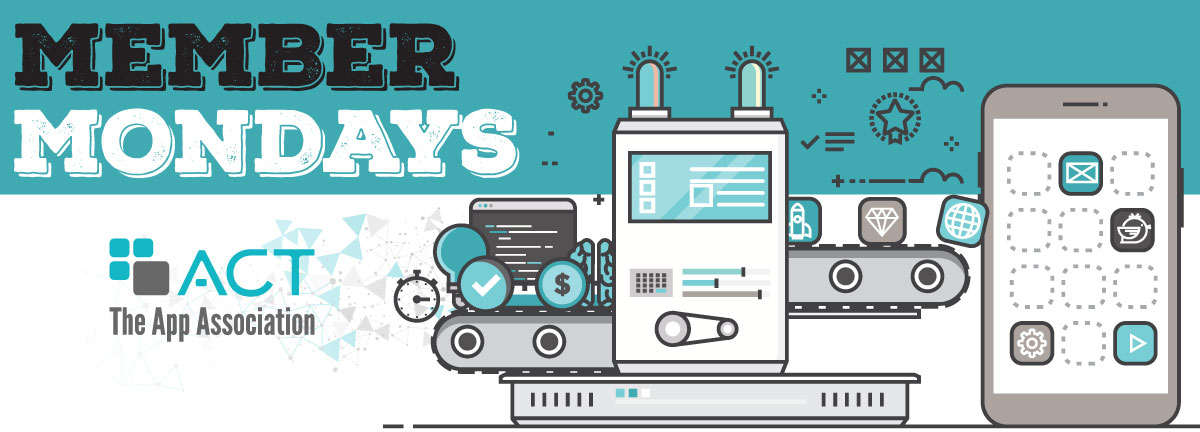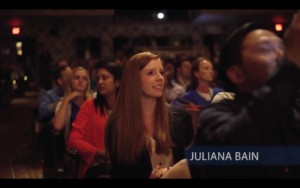
For this edition of Member Mondays, our membership manager Nick Miller conducted an interview with Juliana Bain. Juliana is a freshman at Cornell University and is the daughter of ACT | The App Association member David Bain from TM Technologies. Juliana is a computer science major and epee fencer at Cornell and intern for DARPA contractor Deep Learning Analytics. Juliana is producer and narrator of the 2017 documentary Startup Challengers (www.startupchallengers.com). This documentary chronicles the Challenge Cup Global Impact competition at the start-up incubator 1776 in Washington, D.C.
Nick Miller (NM): Before we get to your Startup Challengers documentary, can you tell us how you got you interested in working in technology?
Juliana Bain (JB): Gladly! There have been a few pivotal moments that drew me in, but equally important, there have NOT been moments that dissuaded me, at least not irretrievably. I think everyone is naturally interested in science and new technology, but something happens along the way (especially with girls) to discourage them or make them think that they can’t contribute.
NM: Did you have opportunities to take computer science education classes during your K-12 education? If so, did these classes increase your interest in majoring in Computer Science (CS)?
JB: There is almost no way I would have become a CS major if not for the chance to study it in grade school. In elementary and middle school I was exposed to platforms like Scratch from MIT and Alice. My high school required all freshmen to take intro CS, which was my gateway into competing in and eventually hosting hackathons. Despite all students at my school taking intro CS, there was a precipitous drop off in females at higher AP and post-AP CS courses. My solution was matching upper class CS students with freshman and sophomore female CS students. That mentoring practice became known as “CSterhood”!
NM: That’s fantastic. Okay, let’s talk about this documentary. What brought you to this project?
JB: This documentary is the story of the participants of the 1776 Challenge Cup, a competition of over 3,000 impact entrepreneurs from 40+ cities worldwide. So far, filming has been at 1776 and at the Ford Theater, the venue for the final stage of this monster global startup competition. One thing that I love about this contest is that not only are the entrepreneurs trying to making a profit, but Challenge Cup competitors are also addressing areas of critical humanitarian need. The winners in 2016 split $250,000, and this year the prizes may be up to $1 million.
from 40+ cities worldwide. So far, filming has been at 1776 and at the Ford Theater, the venue for the final stage of this monster global startup competition. One thing that I love about this contest is that not only are the entrepreneurs trying to making a profit, but Challenge Cup competitors are also addressing areas of critical humanitarian need. The winners in 2016 split $250,000, and this year the prizes may be up to $1 million.
I originally started the project because I have been impressed with the incredible projects emerging from 1776, and I didn’t really see anyone telling this story. 1776 is amazing. The Challenge Cup is amazing, and not enough people beyond D.C. and beyond the rarified startup world really know about it. It is super relevant to the App Association and the concerns of its members because the vast majority of Challenge Cup startups are app-centric.
NM: It sounds like a worthy event to document. What have you learned through the course of the project so far?
JB: Well, I learned how time consuming it is to make documentary! Joking aside, I now realize the incredible power of video to inspire and educate people in ways that I hadn’t fully appreciated before.
The other thing really hitting me with this project is the role of women. I can assure you that, especially in non-Valley impact startups, inclusiveness is alive and well. When you watch the movie (if I may plant a teaser), you may be surprised about the team that is the biggest winner.
I also learned that startups connected to a purpose can often have more tenacity than ones that are simply about popularity or profit.
NM: Do you believe this documentary can inspire kids’ interest in studying computer science?
JB: I really hope so because the vast majority of startups either have a strong computer science component or are entirely app-centric. They say successful startups require a “hipster, a hacker, and a hustler,” usually in that order. The hipster is the idea person with the broad, grand vision, the hacker is the coder, and the hustler is the marketing person who can effectively pitch to investors, customers, and partners. These days it is not unusual for everyone to be somewhat well-versed in some area of CS or at least grasp the underlying data structures or information flows of what they are trying to achieve. The hipster and hustler also often have some design or UI/UX skills to bring to the table. But broadly speaking, I think it’s important for people from all backgrounds who are interested in getting involved in the business world need to have some computer science knowledge.
Moreover, students today need to know that CS is not this monolithic field — within CS there are so many varied disciplines to explore, some harder than others. The good thing about it, unlike, say, playing the violin, is that you can jump in and create something of value basically from week one. People who shy away from any STEM profession, especially CS, because of self-doubt or because they don’t think they are in the “correct” demographic need to just realize that their prejudices against themselves are probably a much bigger impediment to their success than any external bias. At the National Science Foundation, I heard about a study that statistically proved this. They say millennials are digital and smartphone-natives and have been inundated with this tech their entire lives. To me, millennials not learning about computers would be like someone who grew up at the beach never learning to swim.
The most important thing students need to know is that they will reach a point at which it will become hard. At that point, you have to remind yourself that it is hard because it is hard for everyone and not because it is something about you. The harder it is, the rarer and more valuable your experience will be.
NM: Finally, how can people help the documentary to become a reality?
JB: Thank you for asking! We are only halfway through because we are still doing editing and follow-up interviews with the big winners. I would love to have enough of a budget to license real music that really captures the vibe of today’s global impact startup movement and overall do justice to the story. Friends of the App Association can support simply by doing a pre-order of the film, buying a shirt, or becoming co-producer/sponsor of a topic area like education, health, environment or energy. Our Indiegogo page is at www.startupchallengers.com.
Picture provided by Juliana Bain